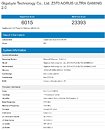Monday, September 10th 2018

Intel Core i5-9600K Surfaces on GeekBench Database
With the swanky Core i9-9900K and Core i7-9700K eight-core chips getting all the attention, the less glamorous Core i5-9600K is taking shape, which could bring a little more performance to the $250 price-point. This 6-core/6-thread chip succeeds the current-gen i5-8600K, and has the same 9 MB of L3 cache. With not much in the way of micro-architectural IPC improvements, barring silicon-level hardening against certain vulnerabilities, which could improve speculative execution performance (versus processors with software patches that inflict performance penalties); Intel has dialed up clock speeds. The chip is clocked at 3.70 GHz, with a maximum Turbo Boost frequency of 4.60 GHz, compared to the 3.60 GHz nominal and 4.30 GHz Turbo Boost frequencies of its predecessor.
The higher clocks seem to bring the i5-9600K a touch higher than the i5-8600K in terms of GeekBench scores, although still nowhere close to the i7-8700 (non-K). The i5-8600K, if you'll recall, beat some of its pricier previous-generation siblings such as the i7-7700, in multi-threaded tests. Someone with access to an i5-9600K put it through GeekBench 4. The chip scores 6,015 points in the single-core test or about 3.7 percent faster than its predecessor (the i5-8600K typically scores 5,800 points), coming from the 300 MHz higher single-core boost. The multi-core score is 23,393 points, which is a meager 2 percent faster (the i5-8600K typically scores around 23,000 points). The generational jump in performance for the mid-range hence seems to have stagnated. At best the i5-9600K will repair the uncertain price/performance equation the i5-8600K has against the AMD Ryzen 5 2600X.
Source:
GeekBench Database
The higher clocks seem to bring the i5-9600K a touch higher than the i5-8600K in terms of GeekBench scores, although still nowhere close to the i7-8700 (non-K). The i5-8600K, if you'll recall, beat some of its pricier previous-generation siblings such as the i7-7700, in multi-threaded tests. Someone with access to an i5-9600K put it through GeekBench 4. The chip scores 6,015 points in the single-core test or about 3.7 percent faster than its predecessor (the i5-8600K typically scores 5,800 points), coming from the 300 MHz higher single-core boost. The multi-core score is 23,393 points, which is a meager 2 percent faster (the i5-8600K typically scores around 23,000 points). The generational jump in performance for the mid-range hence seems to have stagnated. At best the i5-9600K will repair the uncertain price/performance equation the i5-8600K has against the AMD Ryzen 5 2600X.

26 Comments on Intel Core i5-9600K Surfaces on GeekBench Database
If true, this slight gain in single thread is a welcome result. Remember how people expected the security fixes to consume 10-20% of performance? :-)
I'm slightly worried about mobile CPUs front. Since Intel is currently just eating out the frequency headroom and 8th gen were already clocked too aggressively, 9th gen became just a minor update. They haven't even changed the leading digit (still 8xxx). This also means we can't expect anything better until 10nm arrives. :/
Agree with you on the 10nm comment, though. Hopefully at least by then most of the security faults will be fixed in hardware and we can get a bit of a bump in performance...
I said "if" not "should" next time do your homework better.
This is just so boring CPU and shouldn't even exist.
Why 125$? screw it, Intel should sell those for 50$.
Why would all i7 have HT? It's not like there's a physical law that regulates this. :)
i3/5/7 are otherwise meaningless product segments. They tell you just one thing: that i7 is faster than i5, which is faster than i3. Nothing else.
It's there to make life easier for majority of CPU owners, who don't care about the number that follows. They have "an i7" or "an i5", not "an i7-7700".
Once Intel finalizes an architecture, they design the fastest CPU they're going to offer and then the whole lineup is organized (top-down).
Obviously, only the top CPU in each segment is unlocked for OC. Other than that, there aren't any rules. It's just pure financial optimization. If they want 4 variants of i5, they make 4 variants. It's all based on demand.
9700k leaks
browser.geekbench.com/v4/cpu/9742328
browser.geekbench.com/v4/cpu/9677297
Also the results are application & OS dependent, just check Phoronix for instance, but hey why let facts get in the way of um hype for Intel whatisthenext lake :shadedshu:
But I digress, I agree 32gig isn't likely needed for most; but it sure is nice being positive that I'll never have issues with memory in normal workloads.
You could also say consumer i7 always had 4 cores, but now they'll have 6 and 8 cores instead (how dare you Intel!).So?
Seriously, people just buy computers and use them. Not everyone likes to spend evenings reading about HT. :)
I don't even develop or anything on my home computer. It's strictly a gaming/content consumption device (more gaming, content invariably is consumed via an XBOX hooked to my TV). But I am a tech guy, so I like to upgrade and forget about it for a while. At least with the 2500K I could upgrade and forget about it for about 5 years, barring GPU upgrades.
Intel did a performance jump in the 8th gen as a direct answer to Ryzen. Now we're back to incremental improvements like before.
8C/8T and 6C/12T perform similarly in typical multi-thread load. 9700 is the direct successor to 8700. I told you the lineup makes sense. :-)
8C/16T is faster, so they added i9 to the consumer offer.